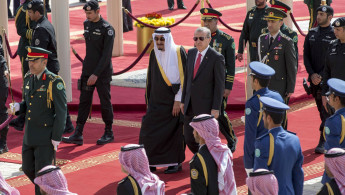A Turkish-Saudi alliance could leave Egypt isolated
With Turkish president Recep Tayyip Erdogan on the last of a three-day visit to Saudi Arabia, a high-level Turkish delegation that arrived Saturday is wrapping up in-depth discussions with their Saudi counterparts in a potentially game-changing summit of the two regional Sunni powerhouses.
The Turkish delegation includes deputy prime ministers Numan Kurtulmuş and Yalcin Akdogan, economy minister Nihat Zeybekci, foreign minister Mevlut Cavusoglu, and a number of leading Turkish businessmen.
Perhaps as a meditative step, Erdogan decided that his entourage should first visit Mecca and perform the umrah pilgrimage before heading to the Saudi capital.
Sisi in town
The Turkish delegation's visit to Saudi Arabia was said to be "pre-arranged", although the fact that it coincided with Egypt's leader Abdel Fattah al-Sisi being in the capital has raised speculation about a possible reconciliation between Ankara and Cairo.
Relations between Turkey and Egypt reached a low point when a coup engineered by Sisi overthrew the government of Mohamed Morsi, an ally of Ankara's.
And Erdogan appears to be in no rush to patch up differences with his Egyptian counterpart.
"Meeting with Sisi is unlikely; it is not on our agenda, and for this to happen serious steps must be taken [to put us on] a positive route," the Turkish president told journalists.
That has not stopped many analysts from speculating that a Sunni alliance might be established to counter Iranian expansion into Iraq, Syria, and more recently Yemen, composed of three of the region's most powerful countries – Turkey, Saudi Arabia and Egypt.
Turkey is seen as the loose cannon in this group. It has traditionally followed a foreign policy independent of its Arab neighbours serving its own interests.
Sunni alliance
One sign of Ankara's reluctance to jump into deals that might backfire was the lengthy, nine-months of deliberations that took place before Turkey agreed to host training camps for the moderate Syrian opposition.
Eventually, these are to be sent into battle against the Syrian army and the Islamic State group, and the deal was largely kept under wraps by Turkey until the story was leaked last month.
As for the "Sunni alliance", Turkey also does not appear to be in a hurry to sign up.
| As for the "Sunni alliance", Turkey does not appear to be in a hurry to sign up. |
Ankara is said to be waiting on the outcome of negotiations over Iran's nuclear programme, and might be worried that forming a coalition would alter the balance of power in the region, which could backfire.
Despite major differences with Tehran on the war in Syria, Ankara does not see Iran as posing the kind of threat to it that Riyadh sees Iran as posing to Saudi national security.
The Kurdistan Workers Party (PKK), which had fought a long and bloody war with Turkey, was taken out of Tehran’s sphere of influence following the implementation of a peace process between Turkey and the Kurdish rebel group.
On Saturday, PKK leader Abdullah Ocalan was even invited to attend an extraordinary congress for the group to abandon the armed struggle against Turkey.
On the other side of the border, in Iraq's semi-independent Kurdistan Regional Government, Turkey is seen as Erbil's key ally.
Ankara also appears capable of maintaining security on its own borders with Syria with a series of suspected secret arrangements with rebel groups.
The Kurdish People's Protection Units (YPG), and even the Islamic State group, are is said to have a clandestine agreement with Ankara.
Meeting of minds
Still, Turkey and Saudi Arabia's views on the Syrian situation meet at several points.
A defining moment in this relationship came after Khaled Khoja, who has close ties with Turkey, replaced Saudi Arabia's "man", Ahmad Jabra, as head of the Syrian National Coalition.
It was only after Khoja was appointed that Ankara agreed to the US-plan to train opposition fighters.
With this in mind, it is likely to be the Syria crisis that is in focus during talks between the Turkish president and Saudi Arabia's King Salman rather than Egypt.
Egypt's regime has suffered from an ongoing internal political crisis and its economy is in dire straits.
At present, Cairo is too weak to force its hand in negotiations with Ankara, or be viewed as an equal partner to either Saudi Arabia or Turkey.
And Erdogan was clear that "serious steps" must be made before a détente with Egypt happens.
It appears that Turkey expects Egypt to change its position towards the Muslim Brotherhood, Hamas, and the Gaza blockade.
A Saudi-Turkish agreement alone could nevertheless be hugely consequential, in particular were the two are in agreement such as Syria and Yemen.
This article is an edited translation from our Arabic edition.
Opinions expressed in this article remain those of the author and do not necessarily reflect those of al-Araby al-Jadeed, its editorial board or staff.



